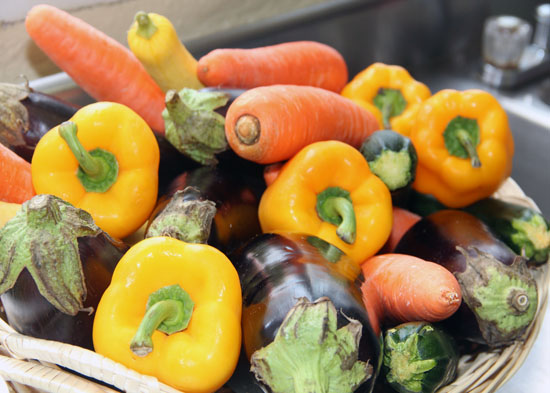He Said, She Said: Marché Restaurants
Is it possible to grow an old concept and still wow people with it?

Julia Heyer: Is it possible to grow an old concept and still wow people with it? The Marche concept, a limited service market station concept, has been around since the 80s but has not lost its appeal. They recently changed their location strategy and twenty plus years ago they were in hotels and downtown areas such as department stores and now they are transportation focused. I recently came across one in an airport and another at an Autobahn gas station rest stop. Who expects lovely design and fresh food merchandising, tossed salad and sausage bars or a freshly made pizza in these locations?
The offering was fresh, delicious and well, rather expensive. Still, expectation exceeded; despite paying 29 Euros for a pizza, juice, two sodas and a latte. One has to appreciate a good lunch in a space where you generally would be happy not to choke on a week-old, dried pretzel – especially when traveling with two toddlers. Why can the Swiss pull this off with panache, while here in the good old USA I still get to pick between a nasty hotdog that’s been sitting on a roller for a day or Twinkies with a half-life?
Vin McCann: If only I was as impermeable to decay as a Twinkie, I’d be a happy camper. Seriously, Jules, I think the strategy makes perfect sense when you stop to consider two significant facts. The Europeans are generally more respectful of their food than Americans, though we seem to be moving, or being pushed by the pundits, in that direction. Secondly, whether you are German, Latvian, or American, the desire for clean, fresh, unsullied by the trio of processed food flavorants (sugar, salt, and fat) and the usual battery of unpronounceable ingredients is a powerful one. There is a nascent move in that direction in our travel spots, but it is more the product of marketing - sounds good, food styled and cosmetically appealing rather than a real shift towards quality.
As we both well know, you can buy a vast array of menu items, frozen, bagged, canned, freeze dried, vacuum packed, ready to assemble, to offer the public. It’s all current, contemporary sounds nutritious, and looks delicious. But like the Twinkie, we just don’t know what exactly has gone into producing them.
Julia’s Response: Isn’t THAT the question: is there really a mass desire for ‘unsullied’ food products? Or is the “slow food, organic, farm-to-table” craving the buzz from a small segment of the population? Disproportionate noise generated by marketeers and the legion of “we know what’s good for you” food writers. If you want my two cents, I think everyone LOVES the idea of healthy, flavorful food, but the realities of availability complicate the issue.
Creating a strong value perception – successfully pairing perceived quality and price is the game changer. While it may be pricey, Marche managed to do that for me. The average consumer is not always able to detect the differences between moderately processed versus freshly made food – no matter which continent he/she lives on. They do however see the difference in pricing. Highly processed foods, such as a KFC double-down tend to be more affordable at $2.99 than the gorgeous, unsullied, organic, hydroponic and hand-massaged lollo rosso lettuce for $8 per pound at the greenmarket (which may even promise to make you the impermeable human boasting a twinkie half-life!). Not everyone can afford it OR sees value in it.
In a time where someone tried to sell me a $40 pound of coffee from the specialty roaster recently, I too see that point on occasion! It all comes back to the value equation, of balancing quality and price. Are the Swiss really better at this balancing act?
Vin’s Last Word: Eight bucks for a pound of lettuce! What are you complaining about? It’s loaded with antioxidants and probably hand harvested by enchanted nutritionists. Forty bucks for a pound of coffee! What’s to balk at when you’re saving an African country or delivering the woman who handpicks the beans from a life of drudgery? Open the wallet, woman! Seriously we may be loading a little too much import on food and that certainly clouds the value formulation. But doesn’t the real challenge lay in the fact that we are living in an age where the quality of food and its availability are not rising nearly as fast as its cost? Success in creating the right value formulation calls for more than a calculator.
Restaurants need a story, a clear brand promise, solid marketing- both internal and external and consistent performance to convince their customers they are paying fair value. Still, there are countless millions who are reduced to eating whatever is available for the money they have in their pockets, but that’s a much bigger issue.


Add new comment